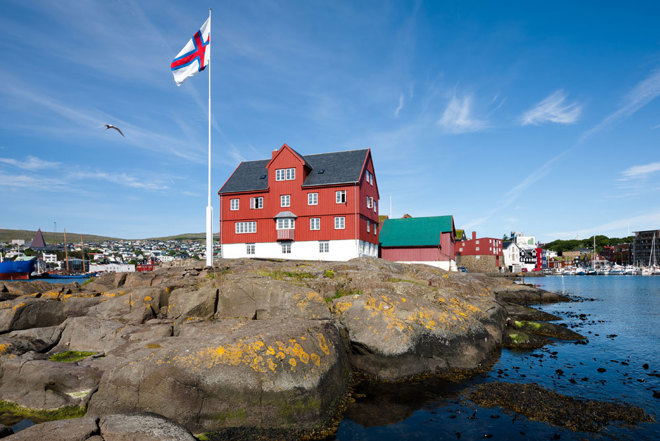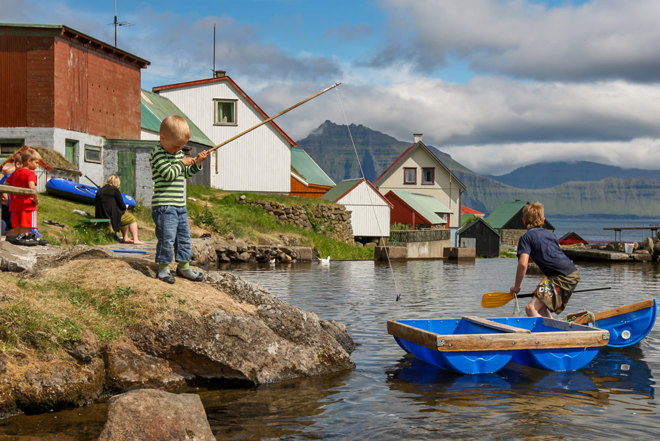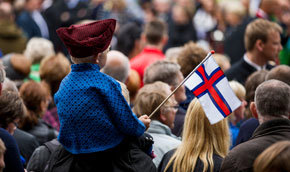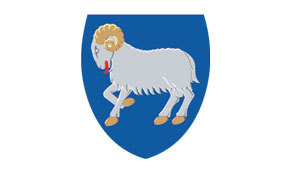Føroyar - the Faroe Islands
Located half way between Scotland and Iceland in the Northeast Atlantic, the Faroe Islands are an archipelago of 18 mountainous islands, with a total land area of 1,399 square kilometres, a sea area of 274,000 square kilometres and a population of approximately 55,000.
The mountainous landscape of the Faroe Islands was shaped by volcanic activity 50-60 million years ago.
The original plateau, consisting of alternating layers of hard lava and thinner soft ash, has been restructured by the glaciers of the ice age, and the landscape has eroded into an archipelago characterised by steep cliffs, tall mountains, deep valleys and narrow fjords.
While 17 of the 18 islands are inhabited, around 40% of the population lives in the capital, Tórshavn.
The name Føroyar (Faroe Islands) is derived from old Norse and means Sheep Islands, a name used by the first Viking age inhabitants. The language of the Faroe Islands is Faroese. It is a West Nordic language, which derives from the language of the Norsemen who settled the islands some 1200 years ago.
Through the centuries, the Faroese have defied the harsh nature and living conditions. What has endured is a nation in which the standard of living is one of the highest in the world.
A highly industrialised economy mainly based on fisheries and aquaculture continues to flourish, with a Nordic welfare system that ensures everyone the opportunity to achieve his or her own potential.
Faroese maritime and fisheries expertise is widely renowned and the Faroe Islands export seafood to all six continents.

A self-governing nation
The Faroe Islands are a self-governing nation under the external sovereignty of the Kingdom of Denmark.
The political system is a variation of the Scandinavian style of parliamentary democracy.
The legislative assembly, the Løgting, one of the oldest parliaments in the world, consists of 33 members elected by popular vote in a single constituency and serving for a period of four years.
The government, Føroya Landsstýri, is headed by the Prime Minister, known in Faroese as løgmaður.
The Faroe Islands have exclusive competence to legislate and govern independently in a wide range of areas. These include among other areas, the conservation and management of natural resources, both marine and terrestrial, protection of the environment, sub-surface resources, trade, taxation, industrial relations, energy, transport, communications, social security, culture, education and research.
A treaty between the Faroe Islands and Denmark enacted in legislation provides for Faroese autonomy in foreign relations.
Although Denmark is a member state of the European Union, the Faroe Islands have chosen to remain outside the EU. Accordingly, the Faroe Islands negotiate their own trade and fisheries agreements with the EU and other countries, and participate actively in a range of international fisheries management arrangements and organisations.

A Nordic welfare society
Faroese society is founded on the Nordic welfare model. The living standard in the Faroe Islands is ranked amongst the highest based on GDP per capita.
Citizens and residents are entitled to a range of publicly financed services, such as social security, healthcare and education.
Active participation in all aspects of local community life characterises the Faroe Islands. This contributes to social cohesion and a strong sense of local identity.
The Faroe Islands have a highly developed infrastructure: telecommunications and high-speed internet, as well as a comprehensive road network and tunnel and ferry connections all provide an excellent base for maintaining the economic, social and cultural viability of communities all around the country.
Positioned strategically between Europe and North America, the Faroe Islands are only a couple of hours’ flight from the metropolitan centres in Northern Europe. From the Faroe Islands there are daily flights and regular ferry and cargo links to all neighboring countries.
The Faroe Islands have a well-educated population, with free primary and secondary schooling for all and a number of institutions for higher education and research.
Many Faroe Islanders study and work abroad in a wide range of fields for a period in their younger years before returning home to settle.
With the characteristic mobility and flexibility of islanders, the Faroese people have long maintained and nurtured a broad international perspective in today’s globalised world.


